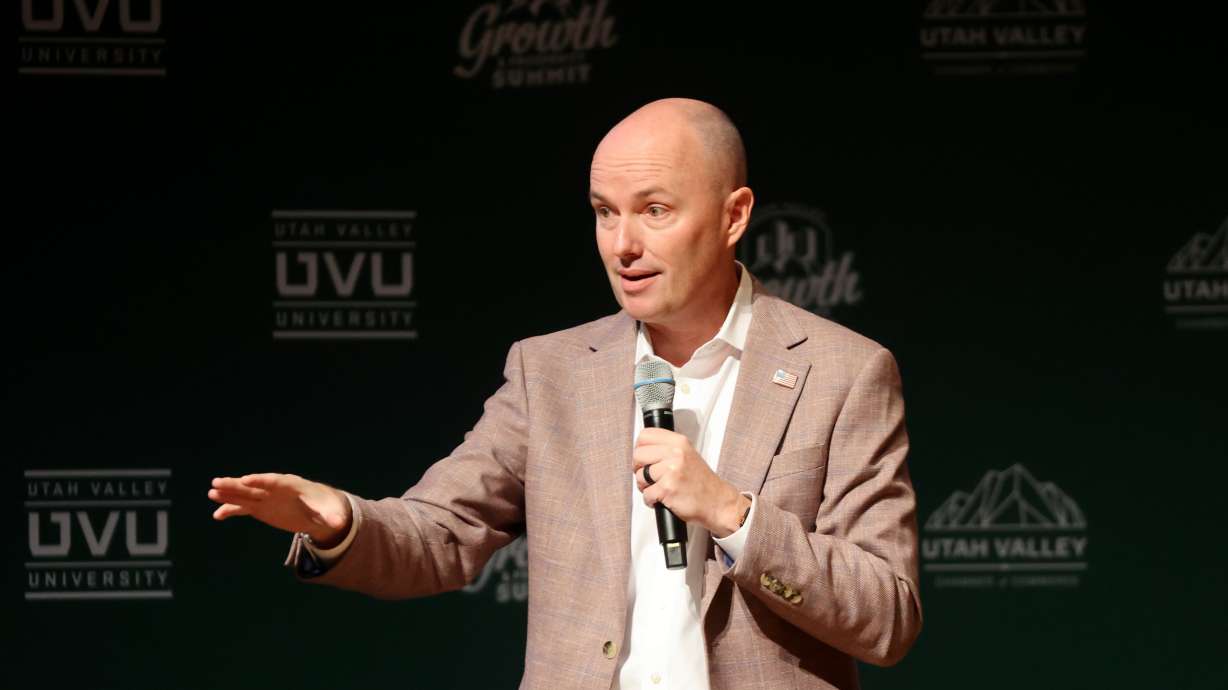Estimated read time: 5-6 minutes
This archived news story is available only for your personal, non-commercial use. Information in the story may be outdated or superseded by additional information. Reading or replaying the story in its archived form does not constitute a republication of the story.
- Utah Gov. Cox urges state leaders to support housing growth amid rising population and costs.
- He emphasizes energy production expansion, highlighting nuclear and clean energy projects.
- Cox stresses maintaining family friendly policies to counteract declining birth rates and ensure future prosperity.
OREM — Utah Gov. Spencer Cox spoke bluntly with Utah County leaders on Thursday. The county, like most of Utah, is booming. But with prolonged prosperity comes spikes in population and an increasingly high cost of living.
The solution isn't to keep transplants out, Cox said, it's to repeat the forward-looking policy approach of past generations or risk ending the Beehive State's streak as the model for the nation.
"Are we going to be the selfish generation?" Cox asked. "I hope not."
Cox called for an abundance agenda, focused on rapid, but smart, growth in housing, energy and family size. Policy is important, but these metrics can't be centrally planned, Cox said.
The message of the recently reelected Republican governor was that Utah leaders must continue to cultivate a "non-zero-sum mindset" that avoids false choices between growth and quality of life.
Housing
One of the biggest obstacles to continued prosperity, Cox said, is affordable housing.
Cox was the first keynote speaker to take the stage at the Utah Valley Chamber of Commerce's fourth annual Growth and Prosperity Summit held at the Utah Valley University campus before a crowd of a few hundred business, government and nonprofit leaders.
The schedule also included remarks from Utah Sen. Mike Lee, former national security adviser John Bolton and former Utah Gov. Gary Herbert.
To avoid becoming "the first generation in history that makes life worse for our kids and grandkids," Cox said local residents, from city council members down to community volunteers, need to start saying "yes" to new housing developments because "every time we say 'no' to reasonable development, we are the selfish generation."
"Everybody understands that we want our kids and grandkids to to have a place to live," Cox said. "But everybody also agrees that we want to build where we can't see it. We just don't want it around us."

It is pointless to wish for less population growth, according to Cox, because the only way to stop growing "is to suck at being a state." But Cox acknowledges that unfettered growth can make life "miserable" if there isn't guidance from the state level.
Housing density and growth are neutral; they become negatives if the state isn't prepared. "We have to invest in infrastructure. That is the only way," Cox said.
Last week, Cox broke ground on a 275-unit starter home project in northern Utah. He said these are the first fruits of the state's innovative 2024 legislation that authorizes the treasurer's office to make $300 million in state savings available for three years to enable local banks and credit unions to offer low-interest loans for developers building affordable homes.
Energy
Another major obstacle, which Cox is confident Utah can overcome, is energy production. With the advent of artificial intelligence, there has been a sea change in the way energy production is being talked about, according to Cox. The imperative is now energy "addition," not energy "transition."
One proposed AI data center project in Utah is expected to use 1.4 gigawatts of power — that's one-quarter of Utah's current energy use and 56% more than the energy consumption of the entire state of Wyoming. With the inevitable growth of AI, Cox says Utah must double its energy production over the next decade.
"We are in a crisis right now," Cox said.
But there are reasons for optimism. Not only does Utah have abundant natural gas reserves and some of the cleanest-burning coal in the world to meet short-term surges in demand, it also has some of the biggest clean energy projects being developed right now in the world.
These include the Millard County Advanced Clean Energy Storage project, which would use "green hydrogen" to store excess wind and solar electricity production, and one of the largest geothermal energy projects in the world found in Beaver County. But the "most important answer," Cox said, must be nuclear innovation.
"We have to lead in nuclear, and we will," Cox said.
Earlier this month, Cox announced "Operation Gigawatt," which would prioritize state investments in increasing power grid capacity, renewable energy research and new policies to facilitate more nuclear and geothermal projects.
Family
But worries about accelerated growth may mask trends of long-term decline. Projections showing Utah's population nearly doubling by 2065? Cox doesn't believe them. Despite its reputation for large families, Utah is part of the wave of developed world regions not meeting the population replacement rate of 2.1 births per female.
"No one has figured out why the world has stopped having babies yet. There are lots of reasons behind that, but we are trending off a demographic cliff," Cox said.
Utah no longer holds the title of highest birth rate, Cox said. "It's not our thing anymore." The Beehive State currently sits around fourth in the nation.
Cox conceded it might seem strange for him to emphasize a shrinking population when Utah is bustling. But without as many young families, growth will eventually turn into stagnation as newer, smaller generations struggle to support programs like Social Security.
The way Cox sees it, if Utah wants to remain the best state in the country, it has to invest in keeping the state family friendly in addition to being business friendly.
"That is what is special about Utah. We care about our communities, that we care about our neighborhoods, we care about our congregations, we care about the people around us. The minute we forget that we've lost the thread."









